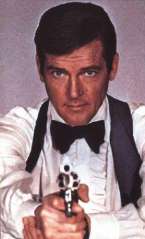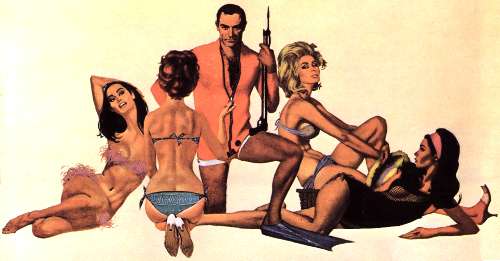| ROGER MOORE IS | 
| JAMES BOND 007 |
But not straightaway. The next film, From Russia With Love, is just another exotic espionage adventure - it has to be said, it's a damn fine film, but it remains completely out of step with the Bond series (although Grant, the blond-haired, super-strong killer, is a character that the films would revamp several times). It's with the third film that it all starts to come together. Goldfinger is another sci-fi film about a mad scheme to blow up Fort Knox and irradiate America's gold supply. Bond gets to drive a souped-up car for the first time - the famous Aston Martin DB5 with its machine guns and ejector seat. This is a fast, funny and engaging film, but let down by the fact that Bond is Goldfinger's prisoner for much of the story's length, and doesn't really have anything to do. Nevertheless, it remains one of my favourites of the whole series.
Thunderball is a spectacular failure - I think its main flaw is that it's just boring. It seems to take nearly an hour before SPECTRE even get around to hijacking the Vulcan bomber for their nuclear blackmail scheme. There are lots of scenes underwater, all of which go on forever. I can rarely watch this film in one sitting. It also is the nadir of Sean Connery's performance as Bond - which brings me to the main problem I have with the sixties films. For many people, Sean Connery is the definitive James Bond. To me, he is the personification of the "sexist, misogynist dinosaur" that M describes in GoldenEye. His leering, sexual arrogance is simply not an appealing character trait - it's just sleazy. The absolutely worst example in the entire series is in Thunderball, where he effectively blackmails Patricia, the health club therapist, into sleeping with him by threatening to report her for negligence and thereby get her the sack. This is nothing short of sexual harassment, and to a modern eye seems quite despicable.

The next film, On Her Majesty's Secret Service, attempts to be more down-to-Earth, in the pattern of From Russia With Love. It's the story of how Bond saves a suicidal Contessa, and eventually falls in love with her, whilst enlisting the aid of her gangster father to track down Blofeld. It all sounds quite straightforward, doesn't it? - but fortunately Blofeld is ensconced in a mountain-top hideout, where he's plotting a real Fu Manchu masterplan, by brainwashing a bevy of beautiful girls to spread a deadly virus across the world. The film's notable for the one and only appearance of George Lazenby as Bond. I don't think he's as bad as some people make out - although his characterization effectively continues from where Connery left off. This may have been acceptable in the sixties, but with a new decade dawning, it's clear that a major change of direction was needed...
Next page: Enter Roger Moore